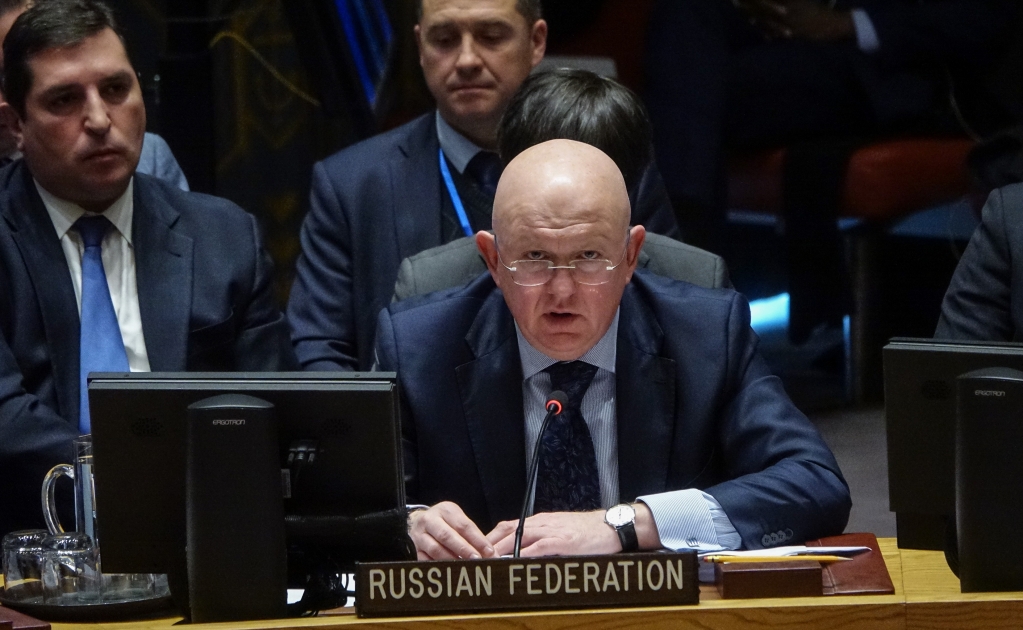Statement by Ambassador Vassily A. Nebenzia, Permanent Representative of the Russian Federation to the United Nations, at the Security Council meeting on the situation in the Middle East, including the Palestinian question
We have listened attentively to the assessment of Mr. Nickolay Mladenov, Special Coordinator for the Middle East Peace Process and Personal Representative of the Secretary-General, of the announcement made in Washington, D.C., recognizing Jerusalem as the capital of Israel.
Washington’s decision on Jerusalem was received with criticism by the Palestinian side and the ArabMuslim world. President Abbas of Palestine emphasized that the move undoes all the international community’s efforts to resolve the Middle East issue. At the same time, Palestinian factions, including the Palestinian Liberation Organization and Hamas, have called for strikes and protest marches in the Palestinian territories of the West Bank and the Gaza Strip.
In Moscow, the decisions announced in Washington, D.C. were received with grave concern. We believe that a fair and sustainable settlement of the long-standing Palestinian-Israeli conflict must be achieved on a basis of commonly accepted international law, including the relevant Security Council and General Assembly resolutions, which provides for the settlement of all aspects of the final status of the Palestinian territories, including an issue as sensitive as that of Jerusalem, through direct Palestinian-Israeli negotiations.
It is an alarming fact that the newly declared position of the United States on Jerusalem risks further complicating the situation in Palestinian-Israeli relations and in the region as a whole. We therefore call on all the parties involved to exercise restraint and refrain from actions that could have dangerous and uncontrollable consequences. Particular attention should be paid to ensuring that all worshippers have freedom of access to Jerusalem’s holy sites.
Russia’s principled position on this issue is unchanged. It calls for facilitating a lasting PalestinianIsraeli settlement that ensures Israel’s peaceful and secure existence within internationally recognized borders and fulfils the Palestinian people’s aspirations to establish their own independent State, in which East Jerusalem becomes the future capital of Palestine and West Jerusalem, the capital of the State of Israel. As a permanent member of the Security Council and an active participant and mediator in the Middle East Quartet, Russia will continue to actively assist the Palestinians and Israelis in achieving the relevant agreements.
We reiterate our firm position that there can be no alternative to a two-State solution. Everyone should have an interest in resolving the PalestinianIsraeli and Arab-Israeli conflicts, and all efforts to achieve that goal deserve support. However, a decision that fails to consider the interests of all of the parties in the Middle East peace process cannot succeed.
We welcome the steps that have been taken to solidify the unity of the Palestinian people with the help of Egypt. We support regional stakeholders’ active involvement in the Middle East peace process, especially that of Cairo and Amman. Russia’s proposal for convening a summit in Russia for the leaders of Palestine and Israel is still on the table. We await the long-promised United States proposals to the international community for settling the PalestinianIsraeli conflict.
We have already asked the United States to explain the rationale for its decision to eventually transfer the United States Embassy in Israel from Tel Aviv to Jerusalem and what effect it imagines that it will have on the international mediation efforts of the Quartet being conducted under the auspices of the United Nations. We have pointed to the apprehensions voiced by Arab and Muslim countries in general, as well as the League of Arab States and the Organization of the Islamic Conference, about how it could undermine or even put a stake through the heart of the negotiations for a two-State solution, in which the States of Israel and Palestine can live fully, side by side and in security, in accordance with the relevant General Assembly and Security Council decisions.
Given the present circumstances, it is more important than ever to relaunch a sensible political process aimed at achieving a lasting and sustainable Palestinian-Israeli settlement based on a two-State solution. In that regard, the Quartet remains a unique international mediation mechanism.
